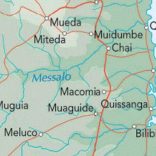Japan emperor expresses ‘deep remorse’ 80 years after WWII
Trump moves to shut down MCC – AIM report

Photo: AIM
The US administration of Donald Trump plans to shut down the foreign aid agency, the Millennium Challenge Corporation (MCC), according to the US magazine “Politico”.
According to an email sent to all MCC employees on Tuesday, and obtained by “Politico”, the MCC is being shut down on the orders of the Department of Government Efficiency (DOGE), the agency run by the richest man in the world, Elon Musk.
In the email, the acting Chief Executive Office of the MCC wrote “We understand from the DOGE team there will soon be significant reduction in the number of MCC’s programs and relatedly the agency’s staff.”
Established by Congress in 2004 under the George W. Bush administration, MCC has enjoyed bipartisan support and has been ranked by the aid transparency group Publish What You Fund as the world’s most transparent bilateral agency.
The MCC currently has over 5.4 billion dollars in active grants across 20 lower-income countries that have either been signed or are being implemented.
DOGE’s attack on MCC follows the Trump administration’s dismantling of the United States Agency for International Development (USAID), which will have a devastating effect on those African countries, including Mozambique, which depended on USAID funding for health programmes, particularly to halt the spread of HIV/AIDS.
Mozambique has also benefitted from the MCC. The first MCC development package (known as a “compact”) was signed in 2007 and ran for five years. It was a grant of 506.9 million dollars. The largest component was a water and sanitation project budgeted at 203.6 million dollars intended to improve access to safe, reliable water supplies and sanitation services.
Road building and rehabilitation was to have taken 176.3 million dollars of the compact (although only 136.8 million dollars was actually spent). The target was to rehabilitate 491 kilometres on key stretches of the main north-south highway (EN1), but this target was eventually cut back to 253 kilometres. The work was not completed until December 2014, well after the end of the compact.
39 million dollars was earmarked for a land tenure services project and 17.4 million dollars to a farmer income support project. The key aim of the latter project was to improve the productivity of coconut farmers in the central province of Zambezia by removing palm trees affected by lethal yellowing disease. MCC claims that more than 780,000 disease-resistant seedlings were planted and more than 15,000 farmers were trained in coconut pest and disease surveillance and control.
The delay in completing some of the projects in the first compact meant that Mozambique did not become immediately eligible for a second contract.
But a second compact was agreed in 2019. Announcing the new compact for Mozambique, the MCC Chief Executive Officer, Sean Cairncross, said. “MCC works around the world to reduce poverty through economic growth—consolidating democratic and free–market reforms, and enabling public and private sector collaboration to create jobs, sustainable growth, and better economic opportunities within our partner countries.”
The compact was signed in September 2023, and was valued at 537.5 million dollars. 500 million dollars is a grant from the US government, and the remaining 37.5 million dollars is Mozambique’s own participation.
The compact concentrates its effort on just one province, Zambezia, in central Mozambique. It covers three main areas – the promotion of investment in commercial agriculture; connectivity and rural transport; and climate change and coastal development. It envisages the construction of a new bridge over the Licungo river, in Mocuba district, and a ring road, that will provide an alternative to the current bridge that carries the country’s main north-south highway (EN1) across the river.
A further 200 kilometres of national, regional and rural roads will be built in Zambezia, to ensure better distribution of agricultural produce. According to the MCC, the compact is also intended to protect the Mozambican coastline from the effects of climate change and over-fishing.
But now, it seems that none of this will happen. In an MCC staff meeting on Wednesday morning, the employees were told that DOGE will draft a resolution as soon as next week for the agency’s board to terminate grants across the world within the next few months.
One employee, granted anonymity out of fear of retribution, told “Politico” the expectation is that within 90 days, all MCC operations will be terminated.
“Our agency has for the past 10 plus years had clean audits, and the reason we’re being closed, even according to the people from DOGE, has nothing to do with our agency being wasteful or corrupt,” this interviewee said.












Leave a Reply
Be the First to Comment!
You must be logged in to post a comment.
You must be logged in to post a comment.